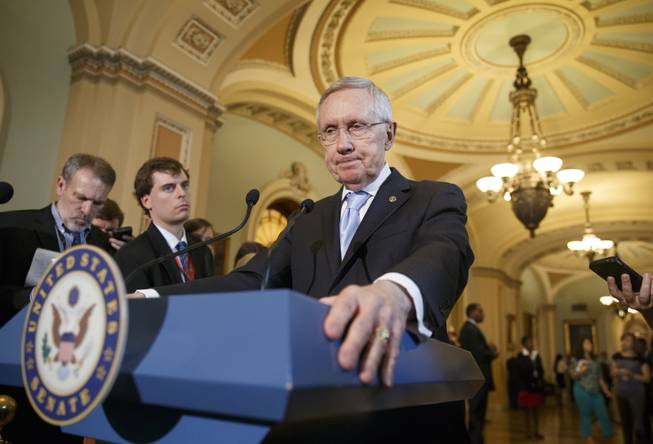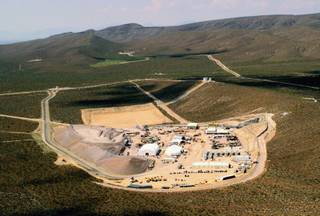
J. Scott Applewhite / AP
Senate Majority Leader Harry Reid, D-Nev., speaks with reporters following a Democratic policy lunch at the Capitol in Washington, Tuesday, Sept. 16, 2014.
Tuesday, Sept. 16, 2014 | 2:26 p.m.
WASHINGTON — Amid action in Congress to intensify the fight against Islamic State militants, Senate Majority Leader Harry Reid found time Tuesday for an issue closer to home: ensuring that a nuclear waste dump in his home state of Nevada remains mothballed even after the government has spent $15 billion on it.
Reid devoted floor time to confirming two nominees to the agency that oversees the nation's nuclear reactors. That means a Democratic-appointed majority will weigh any further steps related to creating a national nuclear waste repository at Yucca Mountain, located 90 miles northwest of Las Vegas.
The confirmations come as Republicans have begun talking about trying to revive the Yucca Mountain project if they retake the Senate in November. The Obama administration, under pressure from Reid, abandoned the project early in the president's first term, leaving tens of thousands of tons of spent fuel sitting at nuclear reactors around the country with nowhere to go.
"There's been a huge investment made there and we've got to find a solution to store nuclear waste," said Sen. John Hoeven, R-N.D. "One difference I can tell you for sure is that we'll have votes on it. Whether we can advance it or not remains to be seen."
Reid vowed Tuesday that Yucca Mountain, which he's spent years working against and can take almost single-handed credit for derailing, would stay dead.
"Yucca Mountain is all through," he told reporters. "As long as I'm around, there's no Yucca Mountain."
But having a potentially sympathetic majority on the Nuclear Regulatory Commission couldn't hurt. Over Republican opposition, the Senate confirmed the nominations of Jeffery Martin Baran and Stephen G. Burns, bringing its composition to three Democratic appointees and two appointed under a Republican administration.
The votes were 56-44 for Baran and 60-40 for Burns.
"Whether these two nominees will act with impartiality and make decisions based on prudence and sound judgment will be seen," Sen. David Vitter, R-La., complained ahead of the vote.
Congress designated Yucca Mountain in 2002 as the one national repository for spent fuel from dozens of power plants around the country over the objections of Reid and the Nevada delegation, but once Reid became majority leader in 2007 he acquired new clout to stop the dump.
He worked to position Nevada as an early nominating state in the 2008 presidential election, which helped ensure that Obama and other Democrats running for president made commitments to oppose Yucca Mountain. Once president, Obama and his appointees moved to shut off funding, close down operations in the Energy Department and shutter the site on a barren volcanic ridge in the Nevada desert, frequented by jack rabbits and desert tortoises.
Reid pushed hard for a former aide, Gregory Jaczko, to lead the Nuclear Regulatory Commission, an independent agency that oversees commercial nuclear operations. Under Jaczko's leadership the NRC allowed the Obama administration's shutdown of the dump to stand, but Jaczko later resigned under pressure amid complaints of a bullying management style.
Last year, a federal appeals court ruled that the NRC was violating the law by delaying work and needed to complete the licensing process. And so the NRC is moving forward on a reduced budget with studying the project and making regular reports to Congress, but little is expected to come of it.
Meanwhile, the Energy Department is trying to implement a new process for finding a different site for a nuclear dump, one where local residents will welcome it. Meanwhile there is discussion of turning the Yucca Mountain site into a data storage facility.
Officials in states that want to get rid of their nuclear waste, and in the nuclear industry itself, can only hold out hope for a solution of some kind, perhaps after the midterm elections.
"We're pleased that anyone is talking about it," said Rob Thormeyer, spokesman for the National Association of Regulatory Utility Commissioners. "We are hopeful that the NRC can proceed, but we recognize that it's going to take an act of Congress in all likelihood to get the ball rolling to the next level."


Join the Discussion:
Check this out for a full explanation of our conversion to the LiveFyre commenting system and instructions on how to sign up for an account.
Full comments policy